Raw cashews are a popular commodity in the business world and are widely traded on a global scale. They are highly sought after due to their numerous health benefits, culinary versatility, and economic value. Raw cashews are widely used in the food industry as an ingredient in various dishes, snacks, and desserts, as well as in the production of cashew butter, cashew milk, and cashew oil. When it comes to purchasing raw cashews in bulk, there are several important factors to consider. These factors include the origin and quality of the cashews, the supplier’s reliability and reputation, packaging and shipping options, and pricing. This article will delve into each of these aspects to provide a comprehensive understanding of raw cashews bulk buying. Origin and Quality: The quality of raw cashews is crucial in determining their value and desirability in the market. Cashews are primarily sourced from countries such as India, Vietnam, Brazil, and Nigeria, which are major cashew-producing regions. These countries have favorable climates and soil conditions that are ideal for cashew tree cultivation. When purchasing raw cashews in bulk, it is important to ensure that the supplier provides detailed information about the origin of the cashews. This information helps buyers assess the quality of the nuts and understand any potential geopolitical or climatic risks that could impact the supply chain. Quality can be determined by factors such as size, color, texture, and taste. Larger cashews are generally preferred as they are deemed more valuable, while a bright, uniform color indicates freshness and quality. Cashews should have a firm texture and a crisp bite, and they should not have any rancid or off flavors. Reliability and Reputation of Suppliers: When buying raw cashews in bulk, working with a reliable and reputable supplier is crucial. The supplier should have a proven track record of delivering high-quality products and meeting their customers’ expectations. It is important to consider factors such as the supplier’s industry experience, certifications, compliance with international food safety standards, and customer reviews or testimonials. Reputable suppliers often have established relationships with farmers and processors in cashew-producing regions, which enables them to provide consistent and reliable access to high-quality cashews. They also have efficient logistics and transportation networks in place to ensure timely deliveries. Packaging and Shipping Options: Packaging and shipping play a significant role in maintaining the quality and freshness of raw cashews. Raw cashews are typically stored in airtight containers or vacuum-sealed bags to protect them from moisture, heat, and pests. This helps to prevent spoilage and preserve the nutritional integrity of the nuts. When purchasing raw cashews in bulk, it is important to ensure that the packaging materials used are suitable for long-distance shipping and storage.
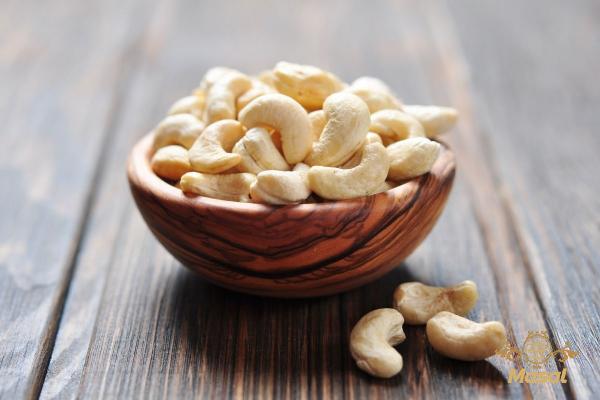
nut
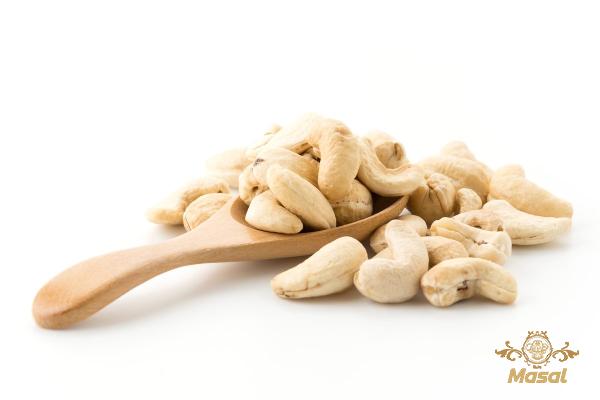 Suppliers should use durable packaging materials that provide adequate protection against physical damage, moisture, and contamination. Proper labeling and barcoding are also crucial for inventory management and traceability. Additionally, buyers should consider the shipping options offered by the supplier. The supplier should have partnerships with reputable shipping companies to ensure timely and secure transportation of the raw cashews. Buyers may also want to inquire about insurance coverage and customs documentation to ensure a smooth import process. Pricing: Pricing is a significant factor to consider when buying raw cashews in bulk. The price of raw cashews can vary depending on factors such as crop yield, availability, demand, and market conditions. It is essential to compare prices from multiple suppliers to ensure competitive pricing while maintaining quality standards. Apart from the price per kilogram or pound, buyers should also consider additional costs such as shipping fees, import duties, and taxes. These factors can significantly impact the overall cost of purchasing raw cashews in bulk. Market Trends and Demand: Understanding market trends and demand for raw cashews is crucial for buyers looking to purchase in bulk. The demand for raw cashews has been steadily increasing due to their rising popularity as a healthy snack and ingredient. Cashews are known for their high nutritional value, including proteins, healthy fats, vitamins, and minerals, making them a popular choice among health-conscious consumers. Additionally, cashews have gained popularity in vegan and plant-based diets as they can be used as a substitute for dairy products and are often processed into alternatives like cashew milk and cashew cheese. This has further contributed to the growing demand for raw cashews in bulk. Furthermore, the food industry’s increasing focus on clean labels, natural ingredients, and sustainable sourcing practices has also boosted the demand for high-quality raw cashews. Consumers are seeking transparency in the supply chain, ensuring that cashews are ethically sourced, and traceability is maintained. Conclusion: Purchasing raw cashews in bulk requires careful consideration of various factors, including origin and quality, reliability of the supplier, packaging and shipping options, pricing, and market trends. Buyers should prioritize working with reputable suppliers who can provide detailed information about the origin and quality of the cashews. Suitable packaging and shipping options are crucial for maintaining the freshness and quality of the cashews during transportation. Pricing should be competitive, considering additional costs such as shipping fees and import duties. By considering these factors, buyers can confidently navigate the raw cashew market and make informed decisions when purchasing in bulk. Purchasing raw cashews in bulk is a strategic decision that requires careful consideration and attention to detail. As a highly sought-after commodity in the food industry, raw cashews offer numerous opportunities for businesses in a variety of sectors. In this article, we will delve into the various aspects of buying raw cashews in bulk and explore the key factors that businesses should consider to make informed purchasing decisions.
Suppliers should use durable packaging materials that provide adequate protection against physical damage, moisture, and contamination. Proper labeling and barcoding are also crucial for inventory management and traceability. Additionally, buyers should consider the shipping options offered by the supplier. The supplier should have partnerships with reputable shipping companies to ensure timely and secure transportation of the raw cashews. Buyers may also want to inquire about insurance coverage and customs documentation to ensure a smooth import process. Pricing: Pricing is a significant factor to consider when buying raw cashews in bulk. The price of raw cashews can vary depending on factors such as crop yield, availability, demand, and market conditions. It is essential to compare prices from multiple suppliers to ensure competitive pricing while maintaining quality standards. Apart from the price per kilogram or pound, buyers should also consider additional costs such as shipping fees, import duties, and taxes. These factors can significantly impact the overall cost of purchasing raw cashews in bulk. Market Trends and Demand: Understanding market trends and demand for raw cashews is crucial for buyers looking to purchase in bulk. The demand for raw cashews has been steadily increasing due to their rising popularity as a healthy snack and ingredient. Cashews are known for their high nutritional value, including proteins, healthy fats, vitamins, and minerals, making them a popular choice among health-conscious consumers. Additionally, cashews have gained popularity in vegan and plant-based diets as they can be used as a substitute for dairy products and are often processed into alternatives like cashew milk and cashew cheese. This has further contributed to the growing demand for raw cashews in bulk. Furthermore, the food industry’s increasing focus on clean labels, natural ingredients, and sustainable sourcing practices has also boosted the demand for high-quality raw cashews. Consumers are seeking transparency in the supply chain, ensuring that cashews are ethically sourced, and traceability is maintained. Conclusion: Purchasing raw cashews in bulk requires careful consideration of various factors, including origin and quality, reliability of the supplier, packaging and shipping options, pricing, and market trends. Buyers should prioritize working with reputable suppliers who can provide detailed information about the origin and quality of the cashews. Suitable packaging and shipping options are crucial for maintaining the freshness and quality of the cashews during transportation. Pricing should be competitive, considering additional costs such as shipping fees and import duties. By considering these factors, buyers can confidently navigate the raw cashew market and make informed decisions when purchasing in bulk. Purchasing raw cashews in bulk is a strategic decision that requires careful consideration and attention to detail. As a highly sought-after commodity in the food industry, raw cashews offer numerous opportunities for businesses in a variety of sectors. In this article, we will delve into the various aspects of buying raw cashews in bulk and explore the key factors that businesses should consider to make informed purchasing decisions.
Specifications of nut
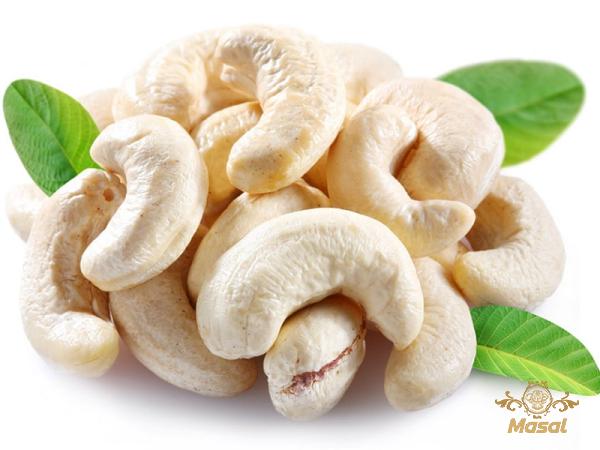 1. Understanding the Market for Raw Cashews: Before venturing into buying raw cashews in bulk, it is important to gain a comprehensive understanding of the market. This includes analyzing market trends, demand patterns, and factors that may influence prices. Stay up to date with industry reports, news articles, and market research to gather insights into the cashew industry’s dynamics. 2. Identifying Reliable Suppliers: Finding reliable suppliers is crucial to ensure a consistent supply of high-quality raw cashews. Conduct thorough research to identify reputable suppliers with a proven track record of delivering quality products. Look for suppliers who have extensive experience in the industry, comply with international standards, hold certifications, and have positive customer reviews and testimonials. 3. Assessing Cashew Quality: Quality is a critical factor when purchasing raw cashews in bulk. Evaluate the quality of the cashews based on factors such as size, color, texture, and taste. Larger cashews are generally preferred, while a uniform color indicates freshness. Cashews should have a firm texture and a crisp bite without any rancid or off flavors. 4. Certifications and Compliance: Ensure that the suppliers you choose comply with international food safety standards. Suppliers should hold certifications such as ISO 22000 or HACCP (Hazard Analysis and Critical Control Points) to demonstrate their commitment to quality and safety. Additionally, certifications related to sustainability and social responsibility, such as Rainforest Alliance or Fairtrade, can add value to your business. 5. Packaging and Shipping Considerations: Proper packaging is essential to maintain the freshness and quality of raw cashews during transportation and storage. Suppliers should use airtight containers or vacuum-sealed bags that protect cashews from moisture, heat, and pests. Furthermore, consider the shipping options provided by the supplier, ensuring they have established partnerships with reliable shipping companies to ensure timely and secure deliveries. 6. Price Comparison and Negotiation: Pricing is a critical aspect of purchasing raw cashews in bulk. Compare prices from multiple suppliers and negotiate to secure the best deal. However, it is essential to strike a balance between cost and quality. Assess any additional costs such as shipping fees, import duties, and taxes to get a comprehensive understanding of the overall cost. 7. Establishing Long-Term Relationships: Building long-term relationships with reliable suppliers can offer numerous benefits. By fostering strong connections with suppliers, businesses can secure consistent supply, receive preferential treatment and pricing, and gain access to exclusive offerings.
1. Understanding the Market for Raw Cashews: Before venturing into buying raw cashews in bulk, it is important to gain a comprehensive understanding of the market. This includes analyzing market trends, demand patterns, and factors that may influence prices. Stay up to date with industry reports, news articles, and market research to gather insights into the cashew industry’s dynamics. 2. Identifying Reliable Suppliers: Finding reliable suppliers is crucial to ensure a consistent supply of high-quality raw cashews. Conduct thorough research to identify reputable suppliers with a proven track record of delivering quality products. Look for suppliers who have extensive experience in the industry, comply with international standards, hold certifications, and have positive customer reviews and testimonials. 3. Assessing Cashew Quality: Quality is a critical factor when purchasing raw cashews in bulk. Evaluate the quality of the cashews based on factors such as size, color, texture, and taste. Larger cashews are generally preferred, while a uniform color indicates freshness. Cashews should have a firm texture and a crisp bite without any rancid or off flavors. 4. Certifications and Compliance: Ensure that the suppliers you choose comply with international food safety standards. Suppliers should hold certifications such as ISO 22000 or HACCP (Hazard Analysis and Critical Control Points) to demonstrate their commitment to quality and safety. Additionally, certifications related to sustainability and social responsibility, such as Rainforest Alliance or Fairtrade, can add value to your business. 5. Packaging and Shipping Considerations: Proper packaging is essential to maintain the freshness and quality of raw cashews during transportation and storage. Suppliers should use airtight containers or vacuum-sealed bags that protect cashews from moisture, heat, and pests. Furthermore, consider the shipping options provided by the supplier, ensuring they have established partnerships with reliable shipping companies to ensure timely and secure deliveries. 6. Price Comparison and Negotiation: Pricing is a critical aspect of purchasing raw cashews in bulk. Compare prices from multiple suppliers and negotiate to secure the best deal. However, it is essential to strike a balance between cost and quality. Assess any additional costs such as shipping fees, import duties, and taxes to get a comprehensive understanding of the overall cost. 7. Establishing Long-Term Relationships: Building long-term relationships with reliable suppliers can offer numerous benefits. By fostering strong connections with suppliers, businesses can secure consistent supply, receive preferential treatment and pricing, and gain access to exclusive offerings.
buy nut
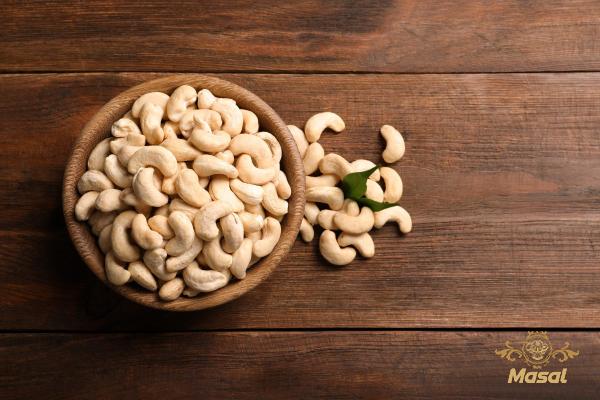 Regular communication and feedback exchanges can help establish trust and strengthen the partnership. 8. Ensuring Traceability and Sustainable Sourcing: In today’s conscious consumer market, traceability and sustainable sourcing have become increasingly important. Ensure that suppliers provide detailed information on the origin of the cashews, including the specific regions and farms where they are sourced. Transparent supply chains and sustainable practices can enhance your business’s reputation and customer trust. 9. Storage and Inventory Management: Once you have procured raw cashews in bulk, effective storage and inventory management are crucial. Cashews should be stored in cool, dry, and well-ventilated areas to prevent spoilage and maintain quality. Consider implementing inventory management systems and labeling techniques to track stock levels efficiently. 10. Expanding Product Offerings: Raw cashews offer a myriad of possibilities for product diversification. Explore opportunities to create value-added products such as cashew butter, cashew milk, or even cashew-based desserts. Understanding consumer preferences and market trends can guide product development strategies and unlock new revenue streams. 11. Maintaining Quality Control: Successful businesses prioritize maintaining consistent quality control throughout the entire supply chain. Regularly conduct quality assurance checks on raw cashews to ensure they meet the desired standards. Implement robust quality control procedures, which may include testing for aflatoxin contamination, the most common safety concern with cashews. 12. Continuous Monitoring and Adaptation: Finally, the cashew market is dynamic, and staying alert to evolving trends and shifts in demand is crucial. Continuously monitor the market and adapt your purchasing strategies accordingly. Regularly assess supplier performance and customer feedback to ensure you are delivering the best products to your target market. Conclusion: Purchasing raw cashews in bulk can be a profitable endeavor for businesses operating in the food industry. By gaining a comprehensive understanding of the market, identifying reliable suppliers, assessing quality, and considering packaging, shipping, and pricing options, businesses can make informed decisions. Fostering long-term relationships, ensuring traceability and sustainability, and maintaining quality control are crucial for success in the raw cashew industry. With careful planning and strategic decision-making, businesses can harness the potential of raw cashews and tap into the growing market demand.
Regular communication and feedback exchanges can help establish trust and strengthen the partnership. 8. Ensuring Traceability and Sustainable Sourcing: In today’s conscious consumer market, traceability and sustainable sourcing have become increasingly important. Ensure that suppliers provide detailed information on the origin of the cashews, including the specific regions and farms where they are sourced. Transparent supply chains and sustainable practices can enhance your business’s reputation and customer trust. 9. Storage and Inventory Management: Once you have procured raw cashews in bulk, effective storage and inventory management are crucial. Cashews should be stored in cool, dry, and well-ventilated areas to prevent spoilage and maintain quality. Consider implementing inventory management systems and labeling techniques to track stock levels efficiently. 10. Expanding Product Offerings: Raw cashews offer a myriad of possibilities for product diversification. Explore opportunities to create value-added products such as cashew butter, cashew milk, or even cashew-based desserts. Understanding consumer preferences and market trends can guide product development strategies and unlock new revenue streams. 11. Maintaining Quality Control: Successful businesses prioritize maintaining consistent quality control throughout the entire supply chain. Regularly conduct quality assurance checks on raw cashews to ensure they meet the desired standards. Implement robust quality control procedures, which may include testing for aflatoxin contamination, the most common safety concern with cashews. 12. Continuous Monitoring and Adaptation: Finally, the cashew market is dynamic, and staying alert to evolving trends and shifts in demand is crucial. Continuously monitor the market and adapt your purchasing strategies accordingly. Regularly assess supplier performance and customer feedback to ensure you are delivering the best products to your target market. Conclusion: Purchasing raw cashews in bulk can be a profitable endeavor for businesses operating in the food industry. By gaining a comprehensive understanding of the market, identifying reliable suppliers, assessing quality, and considering packaging, shipping, and pricing options, businesses can make informed decisions. Fostering long-term relationships, ensuring traceability and sustainability, and maintaining quality control are crucial for success in the raw cashew industry. With careful planning and strategic decision-making, businesses can harness the potential of raw cashews and tap into the growing market demand.





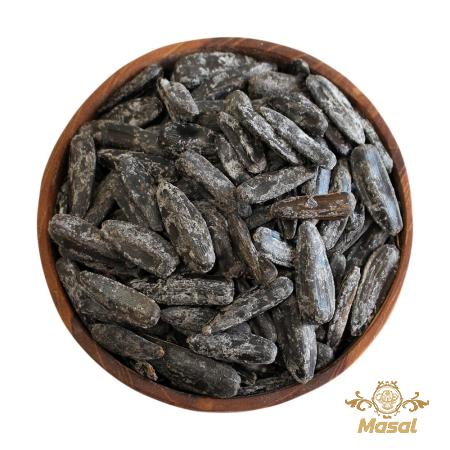
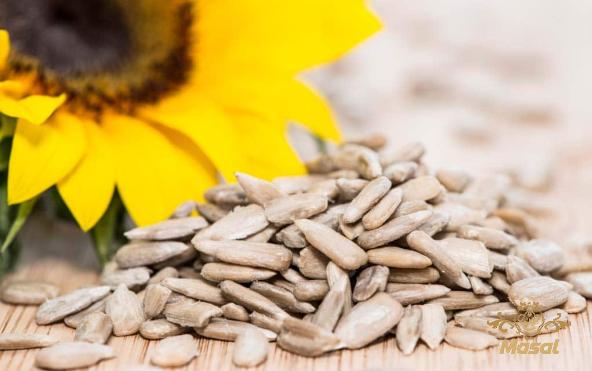
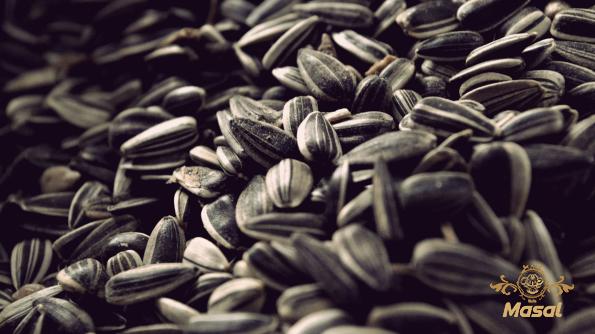


Your comment submitted.